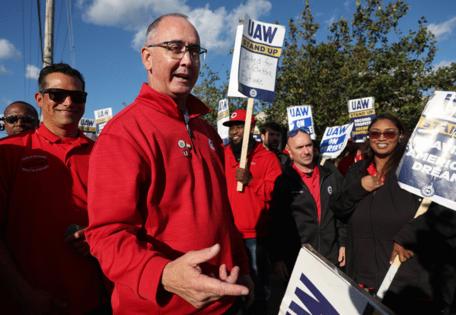UAW membership hits lowest point since Great Recession
Published in Business News
The United Auto Workers at the end of 2023 had its fewest members since the Great Recession, despite record contracts with the Detroit Three automakers, a frenzy of labor action nationwide last year and a vocal organizing push.
The Detroit-based union recorded 370,239 members at the end of December, according to a U.S. Labor Department filing submitted Thursday. The loss of nearly 13,000 workers was a 3.3% decrease from 2022's 383,003 active members, erasing the more than 10,000 members it added that year. It also was the least since 2009, when the UAW had 355,191 members.
A message was left with a representative for the union Thursday evening.
It wasn't immediately clear why there was a decrease, though right-to-work legislation, retirements and layoffs could be contributors, experts said.
In a one-sentence statement last year after the union added members, the newly elected President Shawn Fain had said: "We're just getting started."
To that end, the UAW has undertaken a $40 million campaign to organize employees of foreign automakers manufacturing in the United States, electric vehicle producers like Tesla Inc. and EV battery companies. If successful, the effort could more than double the 146,000 UAW autoworker members for whom the UAW negotiated new contracts with the Detroit Three last fall that resulted in 27% compounded wage increases, the reinstatement of cost-of-living adjustments, improvements to retirement contributions and more.
Fain has emphasized the need to organize transplant, EV and battery workers in order to make greater strides around earnings and benefits for autoworkers like pensions.
The first test of the effort will come in mid-April when 4,300 workers at Volkswagen AG's plant in Chattanooga, Tennessee, will vote on whether to unionize. Two past attempts were close, and the union says a "supermajority" of workers have signed union authorization cards.
With union membership down, that "continues to increase the stakes for Shawn Fain in these votes," said Marc Robinson, principal of consultancy MSR Strategy and a former General Motors Co. internal consultant who was involved in labor negotiations. "It's bad news for the UAW. It probably does increase the pressure if the votes are unsuccessful to say, 'Hey, we can’t spend our declining membership dues on a futile effort to organize.'"
But Art Wheaton — an automotive industry specialist at Cornell University's Industrial and Labor Relations School who has done training for the UAW, GM and Ford Motor Co. — says the membership total isn't too different from what has been seen in the past.
"If they get one more university to sign up, then boom, they're right back in there," Wheaton said. "If they get Volkswagen to join, that'll help. I don't think it hurts their case a whole lot."
He added that the union has momentum behind it with the Detroit Three contract gains, and it has money to sustain the organization. The union ended 2023 with $1.133 billion in net assets, up 8.4% from where it stood at the end of 2022. It brought in about $87.7 million. It paid almost $152 million in strike benefits, including for the targeted "stand-up" strike against GM, Ford and Stellantis NV that lasted up to 46 days.
"I think morale is pretty high, too," Wheaton added. "That makes me more optimistic."
Fain, who took over as president at the end of March 2023 following a runoff election after being an administrative representative in the Stellantis Department, received $228,872 in 2023, including his $198,526 salary and other disbursements. His predecessor, Ray Curry, received $109,142, including a $95,860 salary.
Secretary-Treasurer Margaret Mock received $224,929, including a $201,628 salary. The union paid its three vice presidents as follows: Mike Booth $227,352, including a $195,690 salary; Rich Boyer $216,218, including a $196,050 salary; and Chuck Browning $214,497, including a $195,690 salary.
The impacts of a years-long corruption scandal also were reflected in the union's expenses. The UAW agreed in a consent decree with the U.S. Justice Department to institute a court-appointed monitor for six years. Led by New York attorney Neal Barofsky, his employer, Jennifer & Block LLP, received $5.077 million for "monitor services." Law firm Crowell & Moring LLP, which has been working with the monitor on tasks like the election, received $1.572 million.
The election vendors, Election Systems and Software LLC and Merriman River Associates LLC, also were paid $1.725 million and $1.169 million, respectively, for their work in mailing, collecting and counting the ballots for the union's runoff election early last year.
Among other legal fees was $91,649 to the primary outside law firm that has handled the union's response to the federal corruption investigation. The Detroit News reported in 2020 that the UAW had paid more than $1.9 million since 2015 to the Chicago-based law firm Cotsirilos, Tighe, Streicker, Poulos & Campbell to oversee the union's response to the investigation. The total now is roughly $3.3 million.
Additionally, Exiger LLC, which has been involved in ethics compliance, received $389,952 for legal fees.
Eisner & Dictor PC also provided legal services through the negotiations with the Detroit Three. The law firm received $484,870.
©2024 www.detroitnews.com. Visit at detroitnews.com. Distributed by Tribune Content Agency, LLC.







Comments